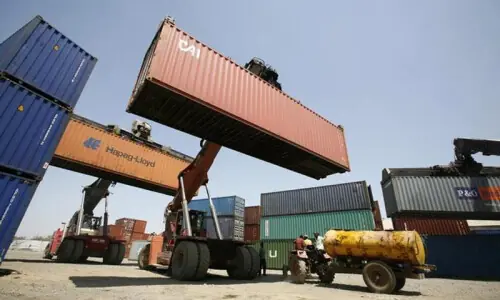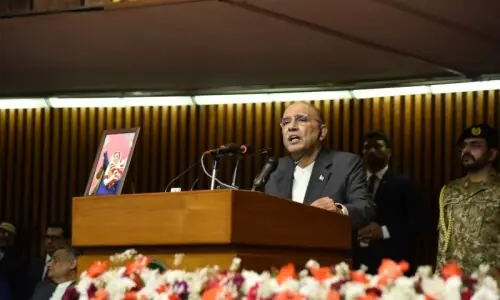LAHORE, May 2: State Bank deputy governor Towfiq Husain on Tuesday said the central bank would continue its tight monetary policy to control inflation. Speaking at the inaugural session of a seminar on Pakistan’s economy at the Lahore School of Economics (LSE), he said inflation had shown downward trends, which needed to be sustained for macroeconomic stability. “The SBP will continue its tight monetary policy for controlling inflation,” he said.
However, he said, the monetary policy alone would not be able to contain the rise of inflationary pressures in the economy. “Hence, there is an urgent need for the government to supplement its supply side measures with policies to address market structure problems.”
He said speculative hoarding and collusive price setting had been significant contributors to the inflationary pressures in the domestic market for many key commodities in the recent years.
“Such pressures respond more to legal and administrative measures, and are less sensitive to monetary tightening,” he said.
Among those present on the occasion were former finance minister Sartaj Aziz, former director of the PIDE Dr A.R. Kemal, economist Sakib Sherani, former commerce minister Muhammad Zubair Khan and former deputy chairman of the Planning Commission and LSE Rector Dr Shahid Amjad Chaudhary.
The deputy governor said the real GDP growth in the country would be in the range of 6.3-6.8 per cent during the current financial year, and the headline inflation was projected to be in the range of 7.7-8.3 per cent.
He said Pakistan needed to continue its macroeconomic policies as the linchpin to restore confidence of both domestic and foreign investors in view of aggressive globalisation and increasing regional competition.
He said that Pakistan’s economy continued to remain on the high growth path during the current fiscal year despite the fact that the real GDP growth for the year was expected to remain below the seven per cent target.
“The forecast of deceleration in economic activity during the current fiscal does not indicate any weakening of the future momentum of growth trends in the economy,” the deputy governor said.
“With substantial investments in the current and preceding year, strong domestic demand, buoyant exports and a relative improvement in FDI, the economy is poised to deliver growth rates in excess of six per cent through the decade,” he said.
“This can happen if progress is made towards removing infrastructural bottlenecks, implementing second generation reforms to improve institutions and governance, as well as to further liberalise the economy,” he insisted.
In the short run, he said, it would be necessary to address emerging macroeconomic imbalances while these were still manageable.
Enlisting key macroeconomic imbalances, he referred to the rise in the current account deficit, a widening saving-investment gap and weakening in fiscal indicators.
He said that a reduction in the rate of inflation and establishment of a clear downtrend would be important priorities for the central bank. “Therefore, there is a clear need to continue with monetary tightening,” he said.
He said that the monetary policy would need to be supported by fiscal prudence. He said the tax-to-GDP ratio should be raised substantially over the next few years. In this context, he added, the reported plan of the Central Board of Revenue (CBR) to seek a one percentage point increase in the next five years needed to be vigorously implemented.
Talking about the mode of financing the fiscal deficit, he said borrowings from domestic sources other than SBP would simply result in a shift of demand from the private sector to the government, but the borrowings from SBP were more inflationary as these contributed to an aggregate demand. “Therefore, the financing of the deficit should be through a healthy mix of bank and non-bank borrowings,” he said.
He said the government should float fresh Pakistan Investment Bond (PIB) issues to lower dependence on the SBP borrowings and to provide a market driven benchmark which was needed for the development of the corporate bond market.
He said that macroeconomic stability and strong economic growth during the last few years had enabled the country to show some progress in social sector development as well.
“In particular, the rising trend of the unemployment rate since the 1993 fiscal, has been reversed during fiscal years 2002-04 despite a faster growth in the labour force,” the deputy governor said.
He also underlined the need to speed up progress in human resource development in Pakistan and said that the acceleration had to be consistent to catch up with the backlog and meet the needs of new entrants.































